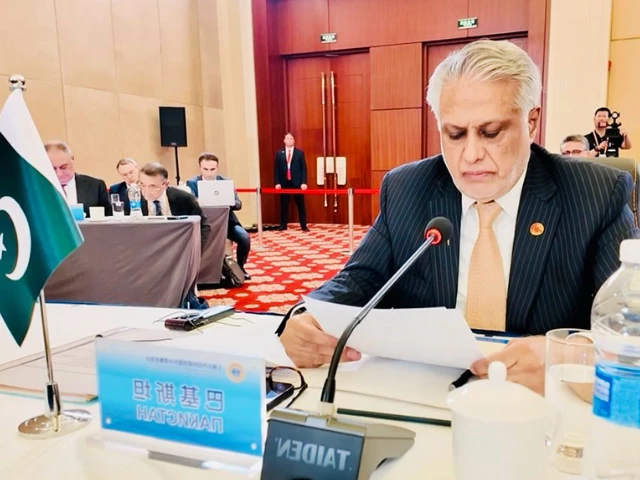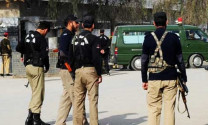Dar backs regional peace, warns Pakistan won't accept 'normalisation of arbitrary force'
Deputy PM holds meetings with Russian, Iranian foreign ministers along with other SCO member states

Deputy Prime Minister and Foreign Minister Ishaq Dar reaffirmed Pakistan’s commitment to peaceful coexistence with its neighbours. However, he warned that Pakistan could not accept the “normalisation of arbitrary force”.
Dar was addressing the Shanghai Cooperation Organization (SCO) Council of Foreign Ministers meeting in Tianjin on Tuesday, where he reiterated Pakistan’s longstanding policy of pursuing peace through dialogue and multilateral cooperation.
Speaking at the high-level gathering, the foreign minister highlighted the SCO’s growing relevance as a stabilising force amid intensifying global geopolitical uncertainty. He lauded China’s leadership in advancing the bloc’s vision and welcomed Belarus as the newest full member of the organisation.
Addressing regional tensions, Dar referred to the escalating situation in South Asia following allegations linking Pakistan to the April 22 Pahalgam attack. “Pakistan seeks a relationship of peace and stability with all its neighbours,” he said. “However, the past three months have seen extremely disturbing developments.”
He said the baseless attribution of the Pahalgam incident — made without credible investigation or verifiable evidence — had nearly pushed two nuclear-armed neighbours to the brink of conflict. “In the wake of mounting tensions, Pakistan’s restrained and responsible approach was met with legal transgressions, rhetorical belligerence, and strategic recklessness,” he stated.
Read More: PTI faces internal rift over August 5 protest plans
Dar further noted that the unfolding events reaffirm a longstanding truth in South Asian geopolitics: the peaceful resolution of unresolved disputes is essential for sustainable peace.
“Pakistan remains steadfast in its commitment to the ceasefire and the cultivation of a stable regional equilibrium,” he said. “However, we cannot accept that the arbitrary use of force is normalised.”
In this context, he called for the initiation of a comprehensive and structured dialogue to address the “full spectrum of issues” that have long plagued peace and security in South Asia. “Strict adherence to bilateral agreements would be equally important,” he added.
Raising concerns over the increasing use of military force as a tool of statecraft, Dar called attention to what he described as a troubling global trend.
In particular, he condemned Israel’s ongoing military campaign in Gaza, describing it as a “reckless disregard for international norms” that has led to an unprecedented humanitarian crisis.
He urged the international community to press for an immediate ceasefire and reiterated Pakistan’s support for a two-state solution, based on pre-1967 borders with East Jerusalem as the capital of Palestine.
Dar also condemned recent attacks on Iran, including US strikes on Iranian nuclear facilities, terming them “unacceptable acts against a fellow SCO member state”, while emphasising the need to uphold international law, implement relevant UN Security Council resolutions, and shun double standards in global diplomacy.
Also Read: Pakistan, Afghanistan trade hits $1b in H1 2025
Moreover, the foreign minister pushed for institutional reforms within the SCO. He proposed the adoption of English as a third official language and called for enhanced capacity within the SCO Secretariat.
Stressing economic cooperation, Dar advocated for the increased use of national currencies in trade to shield member states from global financial shocks and backed the establishment of an alternative development funding mechanism.
Highlighting regional connectivity, he reiterated Pakistan’s commitment to the China-Pakistan Economic Corridor (CPEC), calling it a cornerstone of the Belt and Road Initiative and essential for shared prosperity in the region.
He also urged renewed engagement with Afghanistan through the SCO-Afghanistan Contact Group, stressing a unified approach to counterterrorism and rejecting its politicisation. Climate change, he said, poses a critical existential threat and requires coordinated global action.
Concluding his remarks, Dar reaffirmed Pakistan’s dedication to the “Shanghai Spirit” of mutual trust, equality, and shared development. He urged member states to look beyond confrontation and pursue “a future defined not by conflict, but by collaboration.”
Earlier, Dar represented Pakistan during a joint call of foreign ministers of the Shanghai Cooperation Organization (SCO) member states with Chinese President Xi Jinping.
President Xi, in his address to the visiting foreign ministers, underscored the importance of regional cooperation under the SCO framework — a body spanning the Eurasian landmass and representing a significant portion of the global population.
Delighted to meet earlier today with President Xi Jinping at the Great Hall of the People in Beijing. Conveyed the warm greetings of the leadership, government and people of Pakistan. As iron-clad brothers and All-Weather Strategic Cooperative Partners, we remain committed to… pic.twitter.com/CKU6vnmHpJ
— Ishaq Dar (@MIshaqDar50) July 15, 2025
Dar also held a series of bilateral meetings with his counterparts from Russia, Iran, Kyrgyzstan, and Kazakhstan on the sidelines of the SCO Council of Foreign Ministers meeting, focusing on regional stability and enhanced cooperation in key sectors.
In his meeting with Russian Foreign Minister Sergei Lavrov in Tianjin, both sides expressed satisfaction over the current trajectory of bilateral ties and agreed to further deepen cooperation in trade, energy, and defence.
Dar also extended an invitation to Lavrov to visit Pakistan at a mutually convenient date.
Deputy Prime Minister / Foreign Minister @MIshaqDar50 arrived in Tianjin from Beijing along with other Foreign Ministers for the SCO Council of Foreign Ministers’ Meeting. pic.twitter.com/6spOqRPA94
— Ministry of Foreign Affairs - Pakistan (@ForeignOfficePk) July 15, 2025
In a meeting with Kyrgyz Foreign Minister Kulubaev Zheenbek Moldokanovic at the Great Hall in Tianjin, both sides reaffirmed their commitment to the longstanding Pakistan-Kyrgyzstan relationship and expressed interest in expanding cooperation across areas of mutual interest.
Separately, DPM Dar met Kazakh Deputy Prime Minister and Foreign Minister Murat Nurtleu. The two leaders reiterated their resolve to deepen bilateral ties and enhance collaboration in regional and multilateral fora.
Good to catch up with Foreign Ministers of Iran, Uzbekistan, and Belarus on the sidelines of the SCO CFM in Beijing, just before our joint call on Chinese President Xi at the Great Hall of the People in Beijing. Always good to exchange views for strengthening regional… pic.twitter.com/i3UBLhhXzt
— Ishaq Dar (@MIshaqDar50) July 15, 2025
He also met with Iranian Foreign Minister Seyyed Abbas Araghchi, where he reiterated Pakistan’s commitment to regional peace and stability. The two leaders reviewed bilateral cooperation across various sectors and exchanged views on the evolving regional situation, particularly in light of recent Israeli military aggression against Iran.



















COMMENTS
Comments are moderated and generally will be posted if they are on-topic and not abusive.
For more information, please see our Comments FAQ